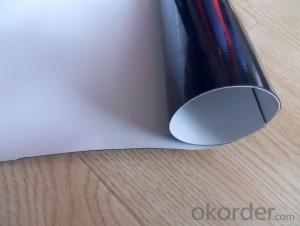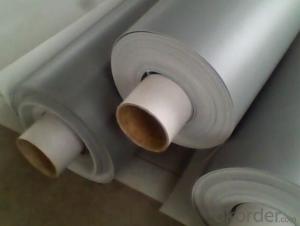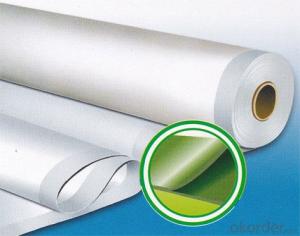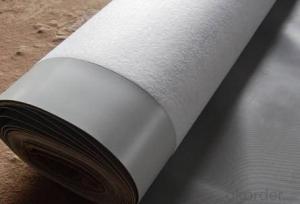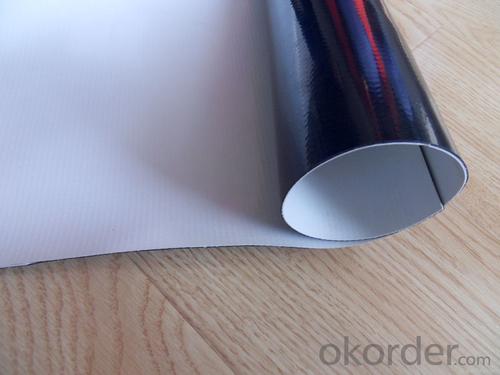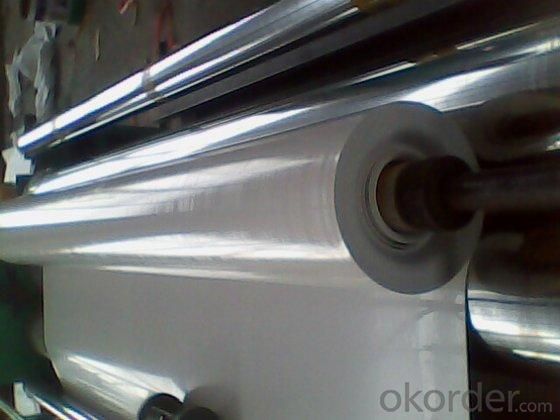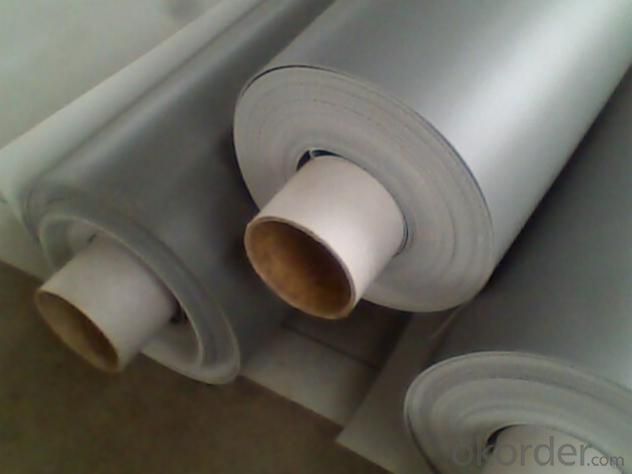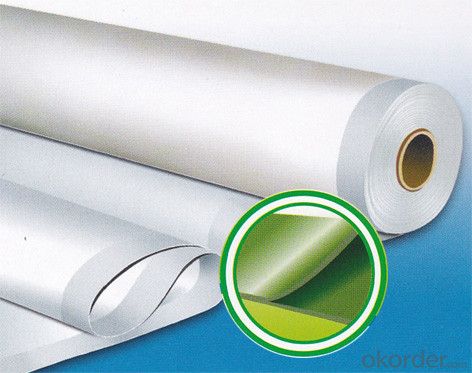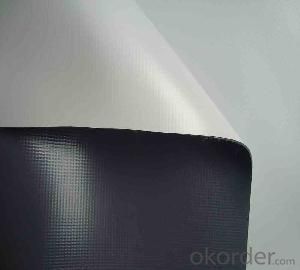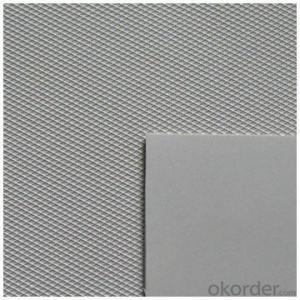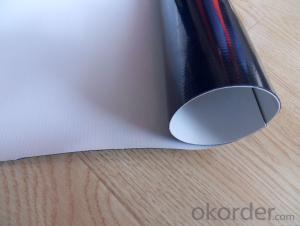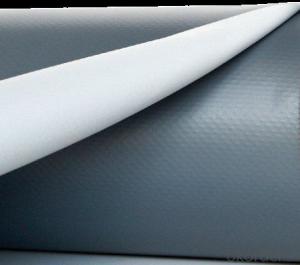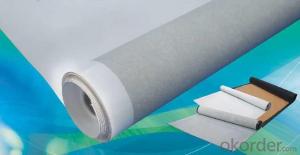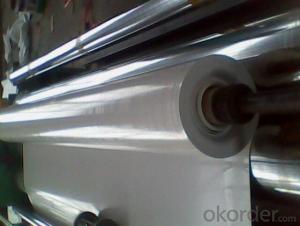PVC Waterproofing Membrane in Polyester Reinforcement in 1.0mm
- Loading Port:
- Shanghai
- Payment Terms:
- TT OR LC
- Min Order Qty:
- 20000 m²
- Supply Capability:
- 5000000 m²/month
OKorder Service Pledge
OKorder Financial Service
You Might Also Like
PVC Waterproofing Membrane in Polyester Reinforcement in 1.0mm
Product Description of PVC Waterproofing Membrane in Polyester Reinforcement in 1.0mm:
PVC Membrane Waterproof /Waterproofing membrane For Roof is a new polymer waterproof membrane. The PVC Membrane Waterproof /Waterproofing membrane For Roof raw material is polyvinyl chloride resin, mixed with plasticizer, filler, antioxygen, ultraviolet absorber and other auxiliaries.
Thickness: 1.2mm/1.5mm/1.8mm/2.0mm
Width:2050mm
Length:20m( Special specifications can be customized)
Size: 2.05mx20m
Color: white/grey, or any other colors.
Features of PVC Waterproofing Membrane in Polyester Reinforcement in 1.0mm:
1. Excellent anti-aging property.
2. Puncture- resistant.
3. Welding construction,
4. High tensile strength, good elongation, good dimensional stability.
5. Good plasticity.
6. It has self-extinguishing from fire property.
7. Materials surface is smooth, fast color, stain resistance.
8. More wide, Wastage become less when being used.
Classification of PVC Waterproofing Membrane in Polyester Reinforcement in 1.0mm:
1. N: Homogeneous PVC membrane
2. L: PVC membrane with fabric backing
3. W: Reinforced PVC membrane
Advantage of PVC Waterproofing Membrane in Polyester Reinforcement in 1.0mm:
1.) Mixing automation. Apply automatic temperature control automatic time control and automatic feed control.
2.) Extrusion equipment uses twin screw coextrusion. Screw temperature uses computer automatic temperature control system.
3.) Handpiece uses large width didhead extrusion equipment.
4.) Sophisticated three-roller calender equipment. The space between equiment is controlled by automation system.
Technical Data of PVC Waterproofing Membrane in Polyester Reinforcement in 1.0mm:
No. | Item | Model Ⅱ | |
1 | Tensile Strength Mpa ≥ | 12.0 | |
2 | Elongation at break% ≥ | 250 | |
3 | Shrinkage rate % ≤ | 2.0 | |
4 | Flexibility at low temperature | No crackle at -25oC | |
5 | Water tightness | Watertight | |
6 | Puncture resistance | Watertight | |
7 | Heat aging treatment | Appearance | Free from bubble, crack, cohesion and void |
Change rate of tensile strength % | +20oC | ||
Change rate of elongation at break | |||
Flexibility at low temperature | No crack at -20oC | ||
8 | Chemical corrosion resistance | Change rate of tensile strength % | +20 |
Change rate of elongation at break | |||
Flexibility at low temperature | No crack at -20oC | ||
9 | Artificial weathering | Change rate of tensile strength % | +20 |
Change rate of elongation at break | |||
Flexibility at low temperature | No crack at -20oC | ||
Application of PVC Waterproofing Membrane in Polyester Reinforcement in 1.0mm:
1) All kinds of roofs, such as steel structure roof, planted roof etc.
2) Underground engineering, such as building basement, subways, tunnels, air raid shelter, etc.
3) Other projects like artificial lake, dam, water reservoir, grain storehouse, etc.
Images of PVC Waterproofing Membrane in Polyester Reinforcement in 1.0mm:
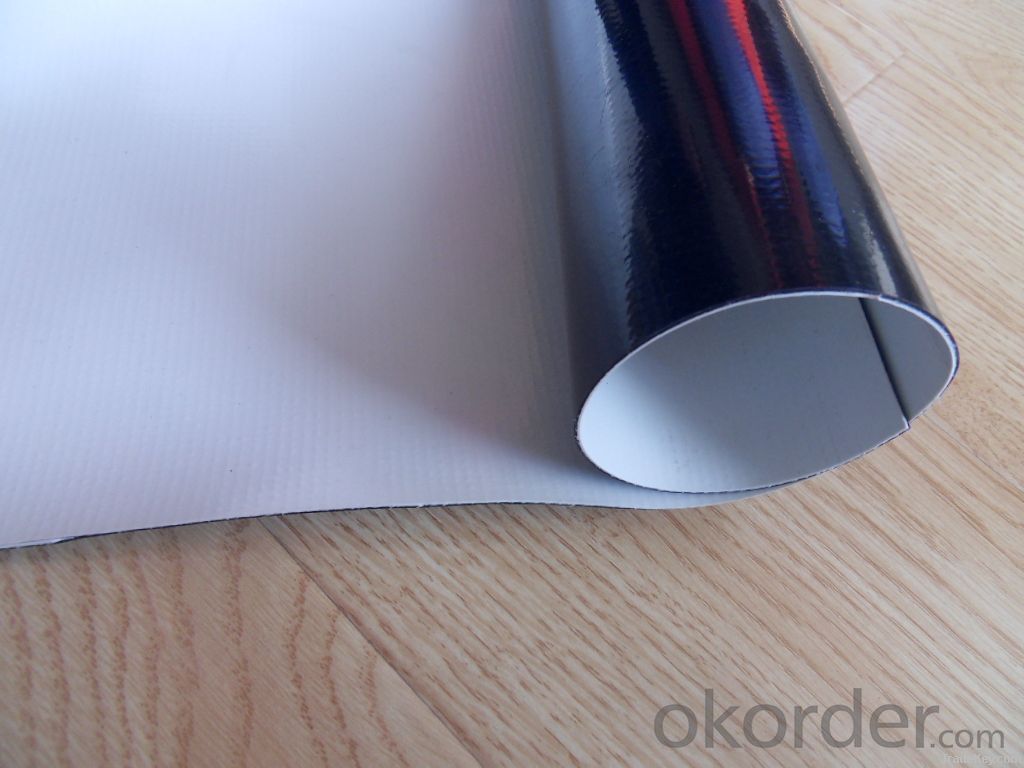
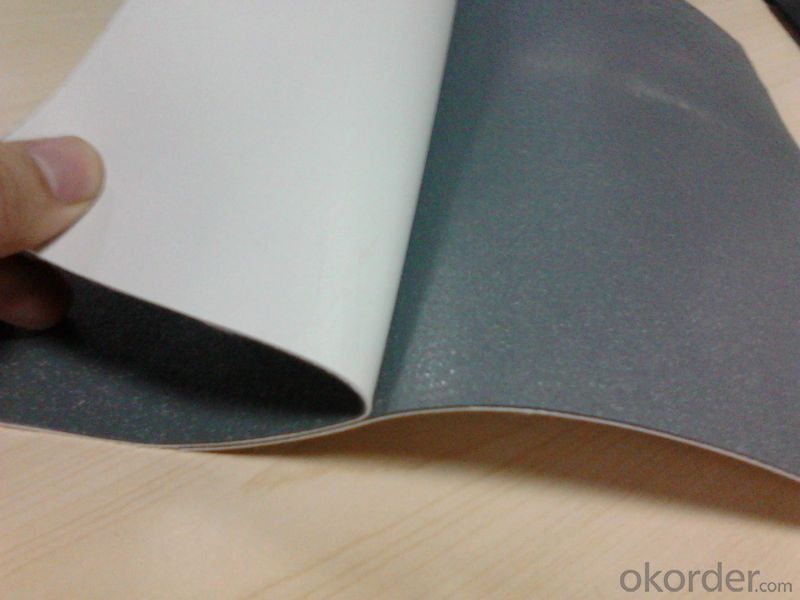
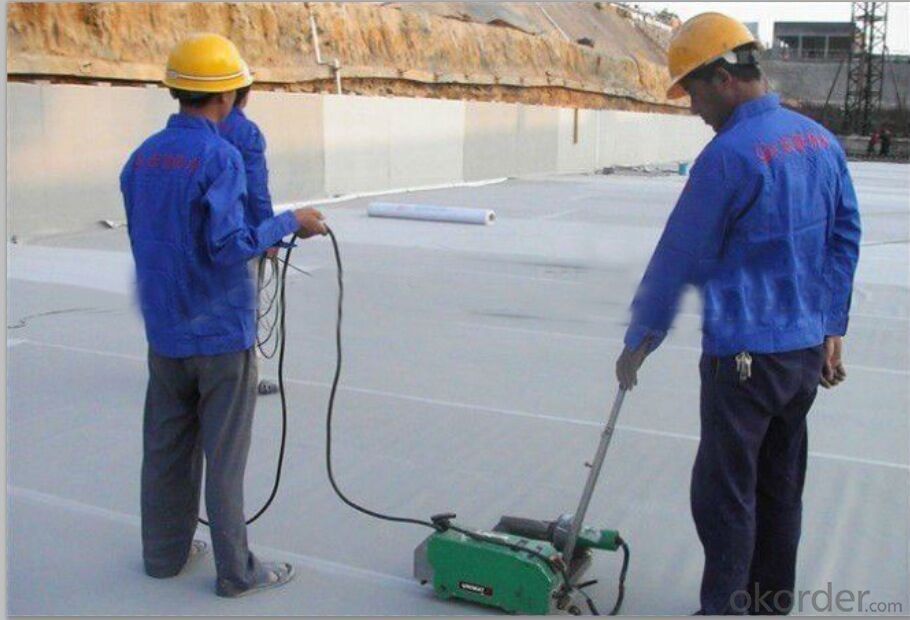
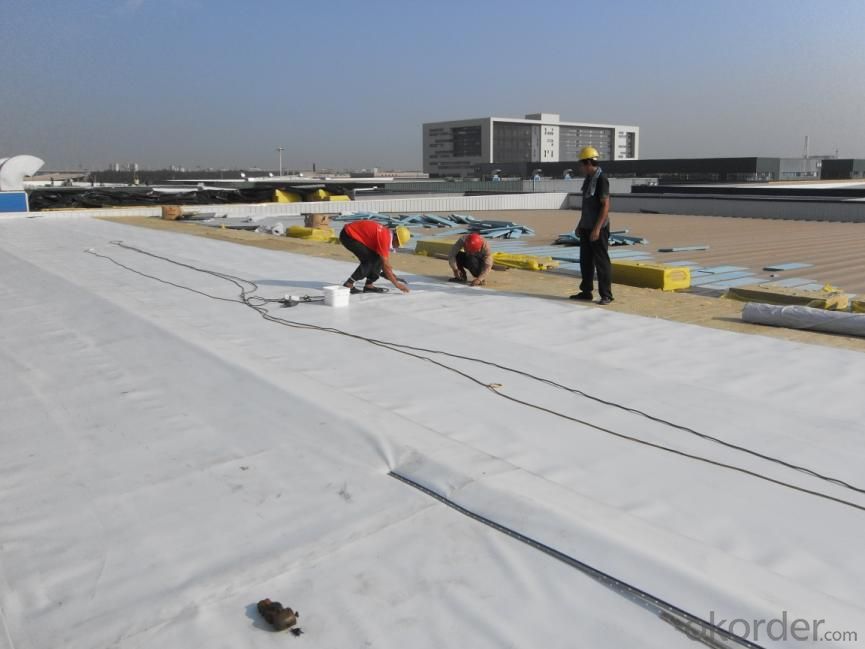
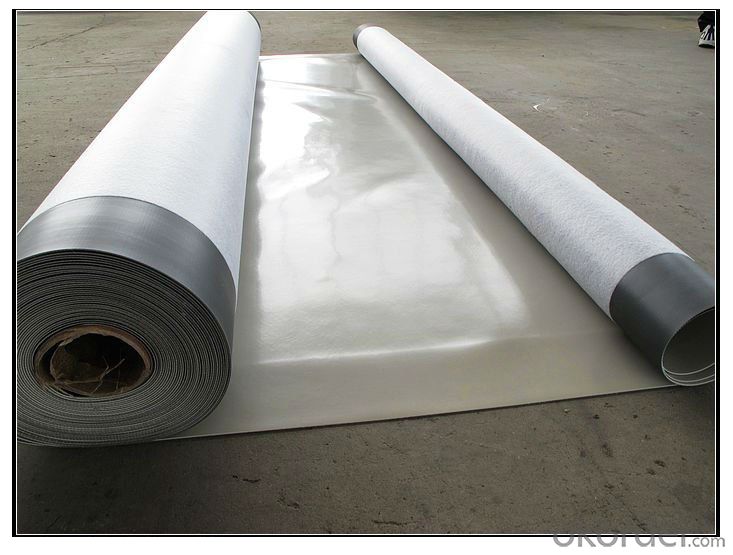
FAQ:
1. Can you produce 4m width?
Yes, no problem for us. We have four bases in China, largest one in this field.
2. How many quantity in one 20'' container for 1.2mm and 1.5mm?
480rolls, 11520m2 for 1.2mm and 400rolls, 9600m2 for 1.5mm
3. Can you provide free samples?
Yes, our samples are free, but express fees usually on buyer's account.
- Q: Can a waterproofing membrane be used on exterior walls?
- Yes, a waterproofing membrane can be used on exterior walls. A waterproofing membrane is designed to provide a barrier against water infiltration and can be applied to various surfaces, including exterior walls. It helps prevent water from seeping into the walls and causing damage such as mold, mildew, or structural issues. By creating a protective layer, a waterproofing membrane can enhance the durability and longevity of the exterior walls, especially in areas prone to heavy rainfall or high humidity. However, it is important to choose the appropriate type of waterproofing membrane that is suitable for exterior wall applications and follow the manufacturer's instructions for proper installation to ensure optimal effectiveness.
- Q: Can a waterproofing membrane be installed on a concrete foundation?
- Installing a waterproofing membrane on a concrete foundation is indeed a common practice. This is done to prevent water infiltration and safeguard the structure from moisture-related harm. Typically, the membrane is applied to the exterior surface of the foundation walls, serving as a barrier against water and moisture. The type of membrane used can vary, ranging from liquid-applied to sheet membrane or a combination of both, depending on the project's specific requirements. Its purpose is to act as a protective layer, preventing water from penetrating the foundation and causing issues like dampness, mold growth, and structural decay. By incorporating a waterproofing membrane into a concrete foundation, homeowners and builders can guarantee the structure's long-term durability and integrity.
- Q: Can waterproofing membranes be used on foundation walls?
- Yes, waterproofing membranes can be used on foundation walls. These membranes are designed to prevent water penetration and protect the foundation from moisture damage.
- Q: Can a waterproofing membrane be used on chrome surfaces?
- No, a waterproofing membrane is not suitable for use on chrome surfaces as it is designed to be used on porous materials such as concrete or wood to prevent water penetration. Chrome surfaces are already water-resistant, so applying a waterproofing membrane would be unnecessary and may damage the chrome finish.
- Q: Floor tiles on the terrace leak, can be directly on the brick shop SBS coil and then cast the cement?
- 2, sealed platform color steel roof waterproof, terrace top waterproof is a comprehensive topic, and now a lot of backstage behind the shops are using SBS linoleum method, but do not feel the most suitable for the most appropriate method. The new bridge doors and windows cover waterproof waterproof composite process, according to the top of the terrace structure, to determine the final waterproof construction process. Many of the processes are: slotted, filled, waterproof side, neutral weather resistant structural seal, SBS linoleum, new water does not leak waterproof material, usually a variety of waterproofing process, because any kind of material A little bit and the shortcomings, so the combination of construction, will make up each other, and ultimately achieve the waterproof effect, so called double waterproof.
- Q: Can a waterproofing membrane be used in conjunction with expansion joint systems?
- The use of a waterproofing membrane can be combined with expansion joint systems. These membranes are frequently employed to prevent the infiltration of water and safeguard structures against moisture damage. In contrast, expansion joint systems are put in place to enable movement and accommodate thermal expansion and contraction in structures. By utilizing both a waterproofing membrane and expansion joint systems, it is feasible to provide both waterproofing and movement accommodation in a structure. This guarantees that the structure is shielded from water damage while still permitting necessary movement. It is crucial to design and install both the waterproofing membrane and the expansion joint system properly to ensure their compatibility and effectiveness.
- Q: Can a waterproofing membrane be used on metal block surfaces?
- Yes, a waterproofing membrane can be used on metal block surfaces. Waterproofing membranes are versatile and can be applied to various surfaces, including metal blocks, to provide a protective barrier against water damage and leaks.
- Q: What are the proper installation techniques for a waterproofing membrane?
- Proper installation techniques for a waterproofing membrane involve thorough surface preparation, ensuring the substrate is clean, dry, and smooth. The membrane should be applied with the correct adhesive or appropriate fasteners, following the manufacturer's instructions. It is crucial to overlap seams and corners correctly, ensuring a watertight seal. Regular inspections and maintenance are also necessary to ensure the longevity and effectiveness of the waterproofing membrane.
- Q: Can a waterproofing membrane be used on concrete slabs or foundations?
- Concrete slabs or foundations can benefit from the application of a waterproofing membrane. These membranes are widely used in construction to safeguard structures against moisture damage and water infiltration. When a waterproofing membrane is applied to a concrete slab or foundation, it forms a protective barrier that prevents water from permeating the concrete and causing problems such as cracking, water damage, or mold growth. This specially designed membrane is capable of enduring hydrostatic pressure, which is the force exerted by still water, and it effectively ensures a dry environment. It is essential to choose a suitable waterproofing membrane that is compatible with the concrete and the specific project conditions. Adequate installation and maintenance of the membrane are also vital for long-lasting waterproofing effectiveness.
- Q: Can a waterproofing membrane be used for historical buildings?
- Yes, a waterproofing membrane can be used for historical buildings. While it is important to preserve the architectural integrity and historical value of such buildings, it is equally essential to protect them from water damage. Waterproofing membranes provide an effective solution to prevent water infiltration and subsequent decay or deterioration. These membranes can be applied to various surfaces, including roofs, walls, and foundations, without compromising the aesthetics of the historical structure. It is crucial to choose a waterproofing membrane that is suitable for historical buildings, considering factors such as breathability, compatibility with the existing materials, and adherence to preservation guidelines. By using a carefully selected and properly installed waterproofing membrane, historical buildings can be protected from moisture-related issues, ensuring their longevity and continued preservation.
Send your message to us
PVC Waterproofing Membrane in Polyester Reinforcement in 1.0mm
- Loading Port:
- Shanghai
- Payment Terms:
- TT OR LC
- Min Order Qty:
- 20000 m²
- Supply Capability:
- 5000000 m²/month
OKorder Service Pledge
OKorder Financial Service
Similar products
Hot products
Hot Searches
Related keywords
